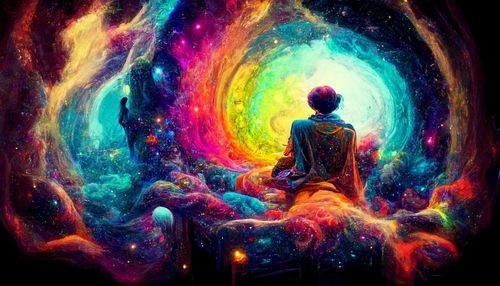 The use of psychedelic substances in religious contexts is an ancient practice spanning various cultures and epochs. These substances, which include plants and fungi that produce profound alterations in perception, cognition, and mood, have been used for millennia to facilitate spiritual experiences and religious rituals. In recent years, there has been a resurgence in interest concerning the role of psychedelics in spirituality, prompted by new research and changing societal attitudes towards these substances.
The use of psychedelic substances in religious contexts is an ancient practice spanning various cultures and epochs. These substances, which include plants and fungi that produce profound alterations in perception, cognition, and mood, have been used for millennia to facilitate spiritual experiences and religious rituals. In recent years, there has been a resurgence in interest concerning the role of psychedelics in spirituality, prompted by new research and changing societal attitudes towards these substances.
Historical Context of Psychedelics in Religious Practices
Historically, many indigenous cultures have incorporated psychedelics as sacraments in their spiritual practices. For example, the use of Ayahuasca, a brew containing dimethyltryptamine (DMT), is central to the religious ceremonies of certain Amazonian tribes. This psychedelic is believed to open pathways to the spiritual world, allowing shamans and participants to experience profound insights and healing.
Similarly, the Native American Church uses peyote, a cactus known for its psychoactive properties, in its religious ceremonies. The peyote ritual is considered a sacrament through which members connect with the divine, seeking spiritual visions and healing. These practices underscore a common belief across cultures that psychedelics help bridge the human and the divine, offering direct experiences of transcendence and interconnectedness.
Modern Scientific Exploration
The modern scientific exploration of psychedelics often focuses on their potential to induce mystical or religious experiences. Studies conducted at prominent institutions have examined the effects of substances like psilocybin, found in magic mushrooms, and LSD on the human psyche. Research indicates that under controlled settings, these substances can produce experiences characterized by a sense of unity, transcendence of time and space, deeply felt positive mood, and ineffability—traits often associated with religious experiences.
One pivotal study by Johns Hopkins University found that participants who took psilocybin under guided conditions reported profound mystical experiences that had significant, lasting personal and spiritual significance. Many described these experiences as among the most meaningful of their lives, akin to the transformative experiences reported by religious mystics.
Therapeutic and Spiritual Benefits
Beyond their historical and cultural roles, psychedelics are increasingly viewed through the lens of therapeutic potential. For many, these substances offer profound spiritual awakenings and insights that can be transformative, particularly for individuals suffering from conditions like depression, anxiety, and PTSD. The spiritual experiences facilitated by psychedelics are often cited as catalysts for personal growth and psychological healing.
In therapeutic settings, the guided use of psychedelics can help individuals confront personal traumas, fostering a greater sense of peace and acceptance. The integration of these experiences into one’s life can lead to improved mental health outcomes and a renewed sense of purpose. This therapeutic approach often overlaps with the spiritual, as individuals reevaluate their beliefs and understanding of the world.
Ethical and Legal Considerations
Despite the potential benefits, the use of psychedelics in religious contexts raises ethical and legal questions. The legality of psychedelic substances varies widely around the world, with many countries strictly regulating their use. However, some regions grant religious exemptions that allow certain groups to use psychedelics as part of their spiritual practices.
The ethical implications of psychedelic use in religious settings also merit consideration. Issues such as informed consent, the potential for psychological distress, and the integrity of spiritual experiences under the influence of substances are subjects of ongoing debate.
The role of psychedelics in religious experiences is complex and multifaceted. These substances have served as spiritual tools for centuries, offering profound insights and transformative experiences that are deeply integrated into the cultural and religious practices of various groups. Modern research supports historical accounts of their powerful effects on human consciousness, suggesting that, under the right conditions, psychedelics can facilitate deeply meaningful spiritual experiences. As society continues to explore the boundaries of spirituality and science, the use of psychedelics in religious contexts remains a compelling topic of cultural and scientific significance.



